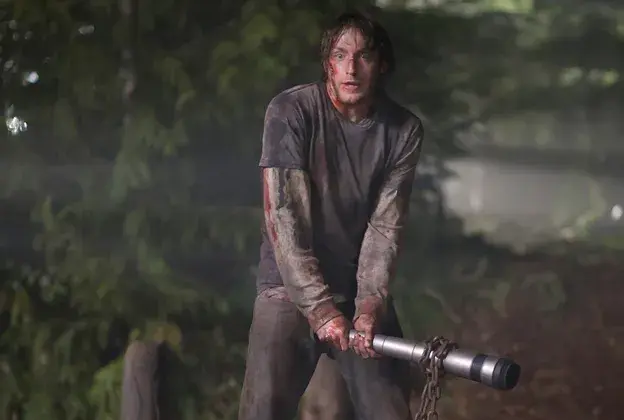Cabin in the Woods (2011): Subverting Expectations (Spoiler Alert)
- Lizbette Ocasio-Russe
- Jul 20, 2024
- 3 min read

If you’re a horrorhound like me, you’ve probably been asked “What is your favorite horror movie?” While many horror films could occupy that slot for me including Nightmare on Elm Street, The Lost Boys, The Descent, and Tragedy Girls, Cabin in the Woods reigns supreme because it subverted my expectations.
The subversion of audience expectations is my favorite aspect of this film. The opening scene before the film title is displayed is a perfect example. Instead of introducing us to the film's protagonists and establishing the plot or conflict, we’re presented with Hadley (Bradley Whitford) and Sitterson (Richard Jenkins) having banal discussions of their personal lives. The film title is dramatically displayed onscreen after Hadley asks Sitterson if he’s paying attention to his lame rant about his weekend plans. It seems so out of place, it’s jarring. Then, we shift to the college-age protagonists getting ready for their trip to the cabin. At this point, we learn about the characters and understand that something fishy is afoot.

The film continues interchanging scenes of the college-age protagonists with scenes of Hadley, Sitterson, and the rest of the gang facilitating the ritual. The back and forth between scenes of clueless protagonists and scenes of in-the-know characters creates much of this film’s meta-aspect. Those conducting the ritual know what’s happening, like the audience, while the college-age protagonists don’t, they’re pawns, horror tropes necessary for the ritual. The audience is like Hadley and Sitterson watching stereotypes suffer on a screen for their benefit, for the completion of a ritual, cinematic in the audience’s case.

Another aspect of the film that subverts expectations is the lose/lose situation of the protagonists. There is no outcome in which the protagonists don’t die. Of course, we don’t learn this immediately; it’s revealed slowly to keep us interested and invested in the characters. Our protagonists/heroes’ success equals the annihilation of humankind, while the victory of the antagonists would save the world. This puts the viewers in a quandary because we’re inclined to root for the likable protagonists.

In the opening scene, the protagonists are established as studious, level-headed college kids except Marty (Fran Kranz) who while intelligent is painted as amusingly paranoid and incompetent because of his pot-smoking. More on this later. The point is: they're a likable group of kids and we want them to beat the bad guys. And beat them they do. If you’ve seen the film, you know the protagonists foil the Director’s (Sigourney Weaver) plan and the ritual that would keep humanity safe from the Ancient Ones. While the protagonists win in this regard, they don’t survive, and they ensure no one else will.

Luckily, there is sufficient satisfaction at the end of the film despite everyone dying and the Ancients rising. First, Marty and Danah ensure the ritual fails, and the Director, along with everyone else in the ritual facility, dies; it’s bittersweet, but a victory for the protagonists nonetheless. Second, and maybe coolest of all, we get a glimpse of the Ancients. The final girl, Danah, says, almost as if speaking for the audience, “I wish I could’ve seen them.” And like a final wish granted, we see the massive hand of one of the ancient gods burst through the cabin and come down hard to the sound of a terrifying roar.

Although Danah is the final girl and she actively fights back throughout the film, it’s Marty, the burnout, who is the true hero in this film. Danah wouldn’t have survived if Marty hadn’t shown up with his coffee mug/bong and stopped the Buckner zombie from killing her by the lake, Jason-
style. Additionally, Marty is the only one who realizes something is wrong at the cabin, and he has his pot to thank for that. Although the chem department “treated the shit out of it” for whatever reason, Marty’s weed wasn’t affected, and the chemical tricks did not influence Marty. While drug use is usually a sin punishable by death in horror movies, as the Nightmare on Elm Street franchise demonstrates, in Cabin in the Woods the burnout is the hero, kind of.



Gabile sohbet ve Yetişkin sohbet yapmanızı kolay ve güvenli hale getiren cinsel sohbet sorunsuz yeni kişilerle tanışma imkanı sağlar.
https://yetiskinchatt.blogspot.com/
https://soh--bet.blogspot.com/
https://www.grepmed.com/chat1
https://allmynursejobs.com/author/yetiskinsohbet/
http://jobboard.piasd.org/author/yetiskinsohbet/
http://www.annunciogratis.net/author/yetiskinsohbet
https://employbahamians.com/author/yetiskinsohbet/
https://rnmanagers.com/author/yetiskinsohbet/
https://rnstaffers.com/author/yetiskinsohbet/
https://www.i-hire.ca/author/yetiskinsohbet/
https://veterinarypracticetransition.com/author/yetiskinsohbet/
https://www.lotusforsale.com/author/yetiskinsohbet/
https://aboutnurseassistantjobs.com/author/yetiskinsohbet/
https://www.montessorijobsuk.co.uk/author/yetiskinsohbet/
https://www.sitiosecuador.com/author/yetiskinchat/
https://aboutsnfjobs.com/author/yetiskinchat/
https://www.ocjobs.com/employers/3420821-yetiskinsohbet
https://jobs.theeducatorsroom.com/author/yetiskinsohbet/
https://cuchichi.es/author/yetiskinsohbet/
https://www.techsling.com/?p=153222&preview=true